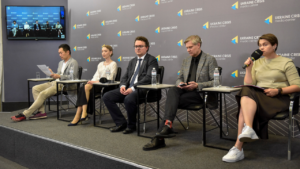For the First Time since Nuremberg: Strasbourg Takes a Step towards a Tribunal for Russia for the Crime of Aggression
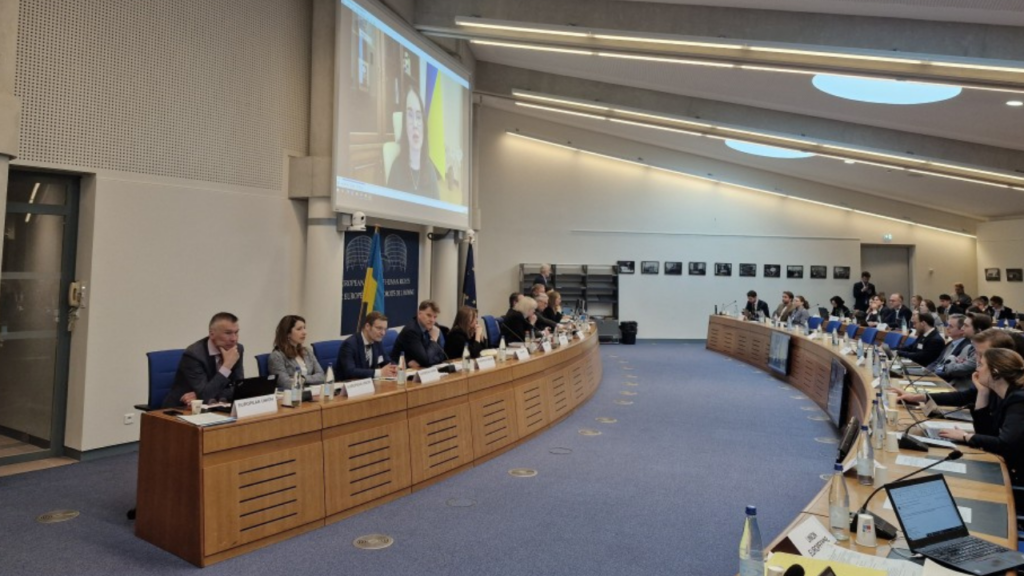
In Strasbourg, the members of the Coalition of States held a final meeting to finalize the technical work on the draft documents necessary to establish a special tribunal for the crime of aggression against Ukraine.
According to Iryna Mudra, Deputy Head of the Presidential Office, this is a decisive step toward restoring trust in international law. “For two years, this Coalition has been working to lay the foundation for justice—for Ukraine and the whole world. I want to express my special gratitude to those who hosted the Coalition’s meetings: The Czech Republic, Estonia, Poland, the Netherlands, Germany, Luxembourg, Austria, Lithuania, Romania, Latvia, the European Union, and the Council of Europe,” Mudra stated. The next step will be to approve the documents at the highest political level and submit them to the Council of Europe for adoption and launch of the tribunal.
The MIHR has studied the experience of previous international tribunals and found that, throughout the history of international law, only once has a state’s leadership been held accountable for the crime of aggression. That occurred to the German leaders at the Nuremberg Tribunal in 1946 and, two years later, to their allies—the Japanese—at the Tokyo Tribunal. No later international tribunal, including those for Rwanda and the former Yugoslavia, has considered the crime of aggression. Moreover, no legal mechanisms exist to hold individuals accountable for this crime. In other words, none of the existing international courts has jurisdiction to convict Russia’s political and military leadership, including Putin, Medvedev, Shoigu, and Gerasimov.
There are two ways to address this gap in the international legal system: by creating an international tribunal or by expanding the jurisdiction of the International Criminal Court. The MIHR discusses both strategies.
The ICC and the Kampala Amendments
UN General Assembly Resolution 3314 defines military aggression as the use of armed force by a state against another state’s sovereignty, territorial integrity, or political independence.
The Rome Statute of the ICC, adopted in 1998, did not include this type of crime. The provisions on the crime of aggression and the relevant amendments to the Rome Statute were approved only in 2010, without entering into force. They only activated on July 17, 2018. Those amendments were adopted in the Ugandan city of Kampala; thus, they are known as the Kampala Amendments. Roman Romanov, Director of the Human Rights and Justice Program at the International Renaissance Foundation, explains that this occurred due to a lack of consensus on the crime of aggression in 1998. That is why there were years of delay.
—The changes made at the Kampala conference resulted from a complex compromise,—he says. — The permanent members of the UN Security Council, who were involved in these discussions, managed to preserve their veto power concerning the crime of aggression.

Roman Romanov, Director of the Human Rights and Justice Program at the International Renaissance Foundation
Only 46 countries, including Ukraine, have ratified the Kampala Amendments by now. As a result, the ICC is unable to consider many conflicts. Romanov attributes this to a lack of political will. Some countries were dissatisfied with the solution reached in Kampala: the compromise was that the permanent members of the UN Security Council play a key role in determining whether a case can be referred to the ICC for an investigation into the crime of aggression.
Russia’s war against Ukraine has shown that this approach is far from optimal. Any permanent member of the UN Security Council can block accountability for aggression. This is now being used as a tool of political influence over the ICC’s activities.
The International Criminal Court has formally been able to prosecute the crime of aggression since 2018. However, this does not apply to the Russian-Ukrainian war, as the crime of aggression has a unique jurisdictional regime that cannot be applied equally to others outlined in the Rome Statute. If a state is not a party to the ICC, the court cannot hold its leadership accountable for the crime of aggression. The only exception is when the UN Security Council refers a case to the ICC involving a specific individual from a country that has committed the crime of aggression.
In 2000, Russia signed the Rome Statute but never ratified it. In 2016, Putin signed a decree withdrawing Russia from the treaty. Obviously, Russia will not ratify the Rome Statute, and as long as it holds veto power in the UN Security Council, a case on the crime of aggression in the Russian-Ukrainian war will never be referred to the court.
However, there is another way. The Rome Statute can be amended to expand its jurisdiction to investigate Russia’s crime of aggression against Ukraine. Such ideas are being voiced, although there is no clear plan for their implementation. African and South American countries could become allies in advancing such changes.
— It’s not about unifying procedures for all international crimes but about expanding the possible approaches for dealing with the crime of aggression. Of course, Russia will veto any initiative to refer a case on the crime of aggression to the ICC—Roman Romanov explains.
One of the options being considered is allowing the UN General Assembly to refer cases to the ICC without requiring a Security Council decision. Romanov notes that Germany supports such amendments, while the United States, the United Kingdom, and France may oppose them.
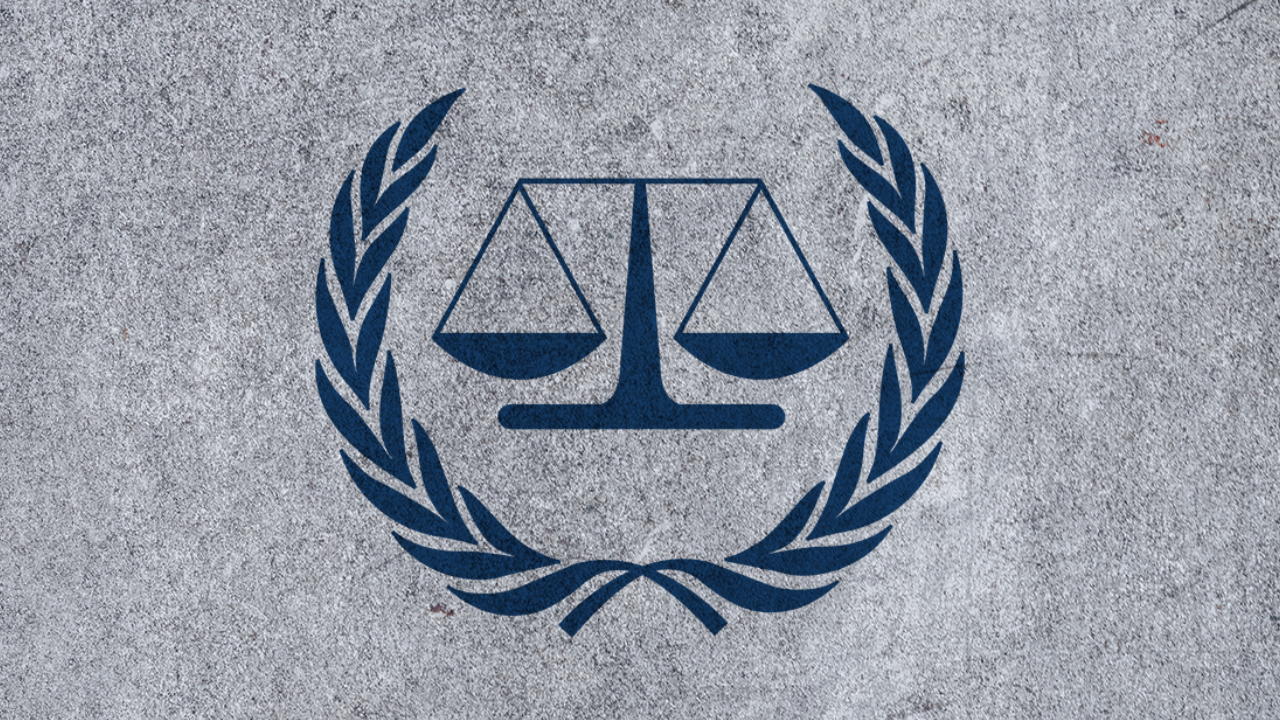
International Criminal Court logo
In the summer of 2025, a conference will be held to discuss possible changes to the Kampala Amendments. However, countries that previously ratified the amendments may oppose them. If successful, the ICC could gain jurisdiction over the crime of aggression committed by Russia against Ukraine.
Despite this possibility, the ICC will not consider the case without the accused being present in the courtroom, meaning Russia’s leadership will not be tried for aggression in absentia. However, in absentia proceedings do not impede the investigation of the crime.
Another issue concerning legal experts is the institutional capacity of the ICC to investigate the crime of aggression in Ukraine. Anna Rassamakhina, an expert at the MIHR, describes this challenge as follows:
— All the verdicts issued by the ICC over the past 20 years have concerned war crimes, crimes against humanity, and genocide committed during armed conflicts in African countries. These trials have lasted for years. However, the ICC has no experience investigating or prosecuting the crime of aggression.
Tribunal and International Law
The international community began searching for effective legal mechanisms to investigate the crime of aggression and establish a corresponding tribunal immediately after Russia’s full-scale invasion of Ukraine. As early as March 4, 2022, then-Foreign Minister Dmytro Kuleba and a group of leading international lawyers presented the initiative to establish a Special Tribunal with the support of the Royal Institute of International Affairs, Chatham House. Since then, the initiative has been supported by the Parliamentary Assembly of the Council of Europe, the European Parliament, the NATO Parliamentary Assembly, and the OSCE.
In September 2022, Ukrainian President Volodymyr Zelenskyi initiated a working group to develop the concept of an international tribunal. Meanwhile, the Verkhovna Rada established an inter-factional union called the “Tribunal for Russian Aggressors,” which supports the development of legal and organizational mechanisms for the tribunal.
On January 19, 2024, the European Parliament adopted a recommendation resolution to establish a special tribunal for the crime of aggression committed by Russia against Ukraine. On January 26, 2024, the Parliamentary Assembly of the Council of Europe (PACE) unanimously voted to establish a special international tribunal for the aggression against Ukraine. Representatives from 41 states have already joined the Coalition (Core Group) to establish the Special Tribunal on the crime of aggression against Ukraine.
Several options for a special tribunal were considered: based on a decision by the UN General Assembly, modeled after the Nuremberg Tribunal, or through a PACE resolution.
— If the special tribunal were created based on the first option, no one would doubt its international legitimacy, — Anna Rassamakhina believes.—However, Ukraine and its partners have not implemented this. The establishment of the special tribunal based on the recommendation resolution of the PACE makes it a regional-level institution. This does not deprive it of legitimacy but endows it with less legal and political power.

Anna Rassamakhina, the MHRH expert on International Humanitarian Law
Anton Korynevych—Ambassador-at-Large of the Ministry of Foreign Affairs and Ukraine’s agent at the International Court of Justice, who is involved in creating the special tribunal—notes that the main discussions within the Core Group are held behind closed doors.
— This is due to the importance and sensitivity of the topic.—He explains. —But the time will come when the results of these discussions will be made public.
He notes that an important outcome was the adoption of the Vienna-Riga Declaration on establishing the special tribunal in January 2024. This demonstrates the willingness to work towards the establishment of the tribunal.
— Previously, there were various options for establishing this body. Today, however, there is a clear understanding that the tribunal should be a separate judicial body with international subjectivity.—Korynevych explains.
According to him, the issue of the tribunal’s jurisdiction and determining who will bear criminal accountability for the crime of aggression is utterly complicated.
The key point is that the tribunal must focus on individual accountability. That means particular attention should be given to overcoming the immunity of Russian high-ranking officials. Currently, this remains an unresolved issue and one of the biggest challenges.
— The tribunal itself will consider that—Korynevych notes.—It is crucial that immunities are overcome within the framework of international justice, not political pressure.
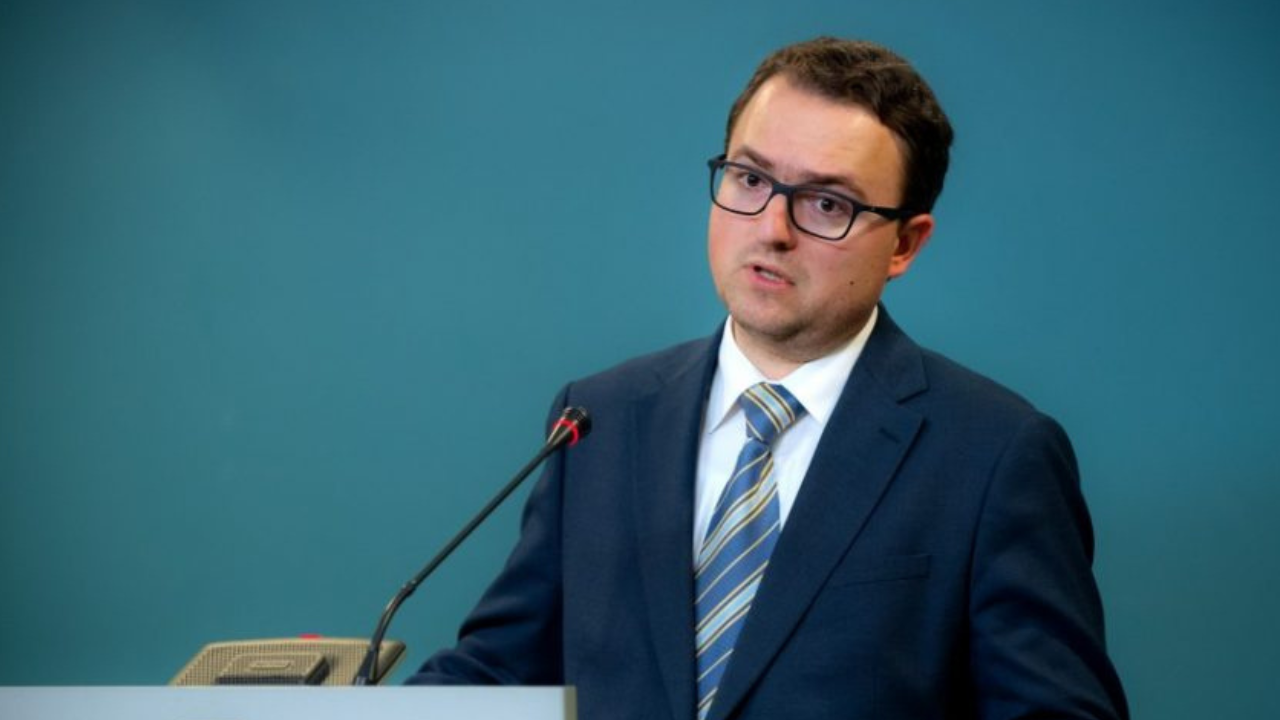
Anton Korynevych, Ambassador-at-Large of the Ministry of Foreign Affairs, Agent of Ukraine at the International Court of Justice
Another issue that still lacks an answer is the definition of the crime of aggression in the tribunal. The one in the Rome Statute differs from the one in Ukrainian legislation.
The Rome Statute defines the crime of aggression as the planning, preparation, initiation, or commission by a person who actually controls or directs the political or military actions of a state of an act of aggression that, by its nature, gravity, and extent, constitutes a flagrant violation of the UN Charter. The Criminal Code of Ukraine defines the crime of aggression as the planning, preparation, or unleashing of an aggressive war, an armed conflict, or participation in a conspiracy to do so.
— This is one of the reasons why the tribunal’s statute has not been agreed upon. Ukraine insists that the definition should align with international law. However, some countries want to base it on the definition from Ukrainian legislation to avoid creating a precedent that could later lead to them being held accountable. But if we take the Ukrainian definition, it will not allow us to overcome personal immunities, — Roman Romanov believes.
In international law, there are two main types of immunity from prosecution for international crimes: personal and functional. Personal immunity applies to the “trio”: the state’s President, the head of government, the minister of foreign affairs. Functional immunity applies to other state representatives who are granted immunity for the efficient performance of their functions.
If the tribunal’s statute is based on Ukrainian legislation, it will be difficult to call it international. Any decision made by it would be interpreted exclusively as related to Russia’s war against Ukraine, meaning it would not become part of customary international law and could not be applied to other conflicts.
— There is a political aspect: partners want to end this war through negotiations, but it is challenging to do so if the Russian leadership is being prosecuted. Secondly, if the Rome Statute definition is applied, certain states’ actions on the territory of other countries could also be classified as a crime of aggression. For some countries, this is important—they do not want to clarify what constitutes a crime of aggression, — Romanov explains. That is why, he believes, some of Ukraine’s partners, such as the United States, support the idea of a Ukrainian definition for the tribunal.
Many international players operate in this field of uncertainty. It is in Ukraine’s interest to add certainty to prevent aggression and ensure accountability for this crime.
Victims of the Crime of Aggression
The space for interpretation of who will be the victim of the crime of aggression is vast. The Nuremberg Tribunal defined the crime against peace as committed against the state’s territorial integrity and inviolability. No specific victims were identified, although the harm caused to people was still discussed in the arguments.
Onysiia Syniuk, legal analyst at the ZMINA Human Rights Center, notes that active debates are ongoing about whether to broaden or narrow the definition of victims of the crime of aggression:
— We have no similar practice. This will be a subject of development in international criminal law. For the tribunal, this is an open issue.
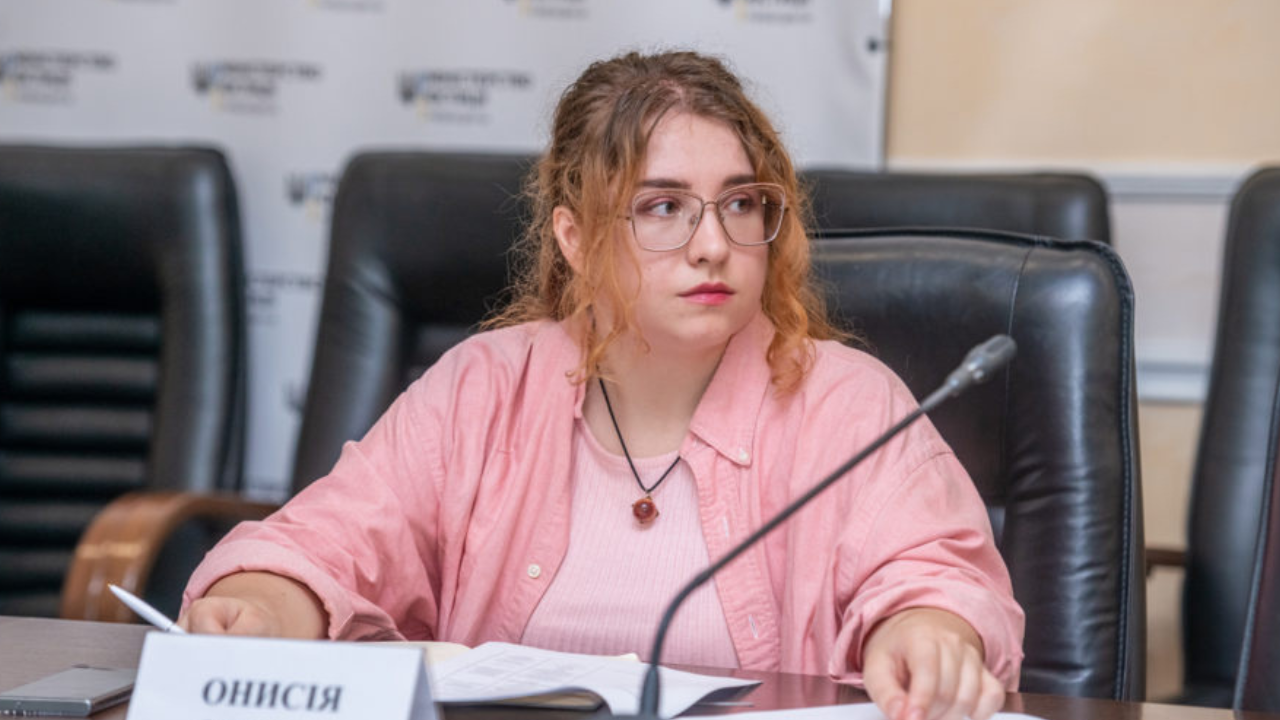
Onysiia Syniuk, legal analyst at the ZMINA Human Rights Center
The definition in the Rome Statute states that the crime of aggression is primarily a crime against the state. However, it is impossible to avoid discussing its impact on individuals. Syniuk believes it is still possible to talk about individual victims, as the definition can be interpreted in multiple ways.
— A crime against the state is not an abstract concept— she continues.—A state is a territory and a population, so a crime against it concerns both. The ICC has a concept of direct and indirect victims. The state is a direct victim of the crime of aggression, while Ukrainian citizens are indirect victims.
Alternative Mechanisms
While legal experts continue working on expanding the jurisdiction of the ICC and establishing a special tribunal, Romanov emphasizes that still no decision has been made on launching an investigation into the crime of aggression. Currently, the investigation is being conducted within Ukraine’s national procedures, while the international investigation mechanism has not been determined.
— There have already been precedents where both the ICC and special tribunals operated simultaneously, such as in the case of the former Yugoslavia. So, the coexistence of multiple mechanisms is entirely possible, — Romanov concludes. He also believes that the most realistic option is to establish a regional tribunal involving countries that are not necessarily members of the European Union.





